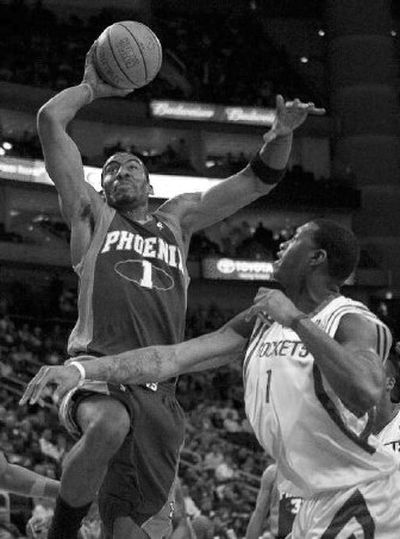Phoenix rising

PHOENIX – Amare Stoudemire has spent many of his 24 years erasing doubts and defying odds.
“The key word is just perseverance,” he said. “That’s pretty much what it’s been my whole life, just perseverance to get through the hard times.”
Now he has done it again.
After microfracture surgery on his left knee, followed six months later by arthroscopic surgery on his right knee, after missing all but three games in 2005-06 because of those injuries, Stoudemire again is a dominant NBA player.
He earned a spot on the All-Star team and, remarkably, was the only member of the Phoenix Suns to appear in all 82 regular-season games.
His inside presence is a major reason the Suns believe they can win it all.
“I never had doubts about me coming back,” Stoudemire said in an interview with the Associated Press. “I had doubts about how long it was going to take. I stayed with it, I pushed through it, I played through the pain, and I was able to accomplish something that probably a player has never accomplished in NBA history.”
There were many doubts among the coaching staff, especially since Stoudemire had signed a five-year, $73 million contract days before undergoing the microfracture surgery on Oct. 11, 2005.
As he began rehabilitation, there were suggestions he wasn’t working hard enough. Those concerns peaked when he chose to sit out a practice during the team’s training camp in Italy last year.
“You always look at the worst-case scenario,” coach and general manager Mike D’Antoni said, “that he could never come back, that you’re saddled with a max contract with a guy that’s not 100 percent. I mean that spells disaster. So yeah, you worry about it, but that’s one that got put to bed in November.”
In hindsight, the hand-wringing seems a gross overreaction.
“You panic because he’s not ready – ‘Oh my gosh,’ ” D’Antoni said. “You don’t know if half the stuff you’re saying is true or not. You try to be honest and truthful, but fear puts a lot of words into you.”
Stoudemire kept insisting he knew what was best.
“I don’t let it get to me. It is what it is,” he said. “I know what my body can handle. I know what I can work through and push through.”
It’s an attitude that can be traced to his rough childhood.
His father died when Amare was 12. An older brother served time in a New York prison for drug and other offenses. His mother has been in and out of jail, and is serving a three-year sentence in an Arizona prison now after a series of aggravated drunken driving convictions.
Somehow, through it all, Stoudemire stayed out of trouble, even as he drifted to a handful of high schools where coaches were eager to exploit his basketball ability.
Still, when he came directly out of high school and entered the NBA draft, teams were wary. But then-owner and current Suns chairman Jerry Colangelo had watched Stoudemire work out and was awed by the youngster’s raw talent.
When Stoudemire slipped to the Suns’ No. 9 pick in the 2003 draft, there were cheers around the team’s draft table in Phoenix.
He went on to beat out Yao Ming for rookie of the year.
In his third NBA season, with new teammate Steve Nash, Stoudemire made his first All-Star game. Against San Antonio in the Western Conference finals, he averaged 37 points, topped by a 42-point performance in Game 5.
Little wonder Phoenix was eager to extend his contract. Concerns about that lingering knee problem didn’t dissuade the Suns from reaching a deal, although management hardly thought the injury would erase an entire year of Stoudemire’s career.
As last season approached, a pair of strong practices boosted D’Antoni’s optimism the big guy could be effective again, but still there was talk of him needing periodic games off.
At first, Stoudemire came off the bench, but was uneven in the reserve role.
Five games into the season, D’Antoni put Stoudemire in the starting lineup. What followed was the best all-around performance of his career.
“I think I’m more of a polished basketball player now as opposed to just being totally athletic,” Stoudemire said. “You may not see eight dunks a game, but you may see three with a few jumpers mixed in – just a total basketball player. You may see spurts of explosiveness, but it’s not like that’s my game totally.”
Stoudemire led the team in scoring at 20.4 points per game, with career highs in rebounding (9.6) and field-goal percentage (.575). He joined Carlos Boozer and Elton Brand as the only NBA players to rank in the top 20 in those three categories.
To be sure, there are fewer “wow” moments. Stoudemire still can muster ferocious dunks, just not as many as before, but he believes his accurate midrange jumper and vastly improved passing and defense make him a better player.